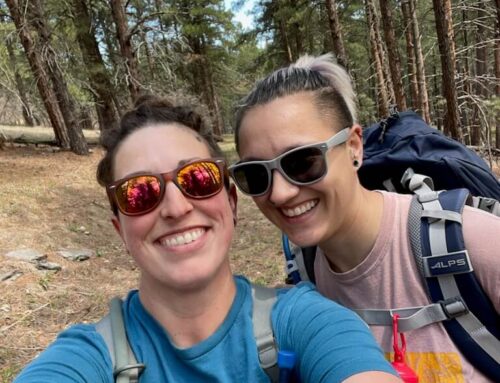Shh! Someone may be sleeping nearby. It’s baby time in Colorado and our state is enjoying a burst of new births. But just as with humans, wild baby animals need to be treated with care.
Jennifer Churchill, public information officer for Colorado’s Parks and Wildlife, spent some time with your friends at DeckTec to update us on best nursery practices in the wild.
“This time of year, the end of March through April, is baby season,” said Jenn. “We can see all sorts of wonderful wildlife right now, especially baby birds and small mammals, out and about. The best thing to do when you see a baby critter is to let it be.”
Jenn said she realized this is difficult, because, as humans we want to nurture and care for babies, but Mother Nature looks after them pretty well. Jenn broke the animals you may see into these categories and care suggestions:
Birds and Raptors
“While it is a myth that touching a baby bird will scare its parents away permanently, you should still leave it alone,” said Jenn. “Often these youngsters are found on the ground and people want to scoop them up.” She explained that the young birds haven’t really fallen out of any nests, but are fledging. They have their feathers and muscles, and are teaching themselves to fly. By intervening, humans can accidentally stall a young bird in this important stage of life.
“Of course, if the bird is in your back yard, you’ll want to keep your pets away from it,” said Jenn. “And if the bird is a raptor, you must by law leave it alone.” Raptors include such birds as hawks, eagles, falcons, and owls. These are all considered protected species by the federal government.
Jenn talked about a local television personality who had a baby raptor, a red-tailed hawk, nesting in her yard. This was quite inconvenient, as the woman had children and pets that wanted out. “But raptors will defend their young and it would have been dangerous for both the family and the birds.” The woman was convinced to leave the birds alone.
Small Mammals
Colorado has a large variety of small mammals that are born in spring around here. These bunnies, fox kits, coyote pups and more play joyfully near our homes and open spaces. It is very tempting to interact with them when they come out of their nests and dens from the end of March through June, but again, please don’t touch.
“While it is true birds won’t have trouble with your scent, young mammals will,” said Jenn. She explained that young mammals are often born without a scent. This lack of scent is a protection from predators. If you touch and transfer your human scent to these babies, they will be easier for predators to find, and your scent may permanently frighten off the babies parents.
What should you do if you see a small creature in your yard? You guessed it.
Leave it alone.
You can watch the baby from afar, and if it is still alone 24 hours later, call the Parks and Wildlife team–303.291.7227. There are voluntary transport teams that serve the Denver metro area and will try to transport your find to a rehab center if there is room. But these are voluntary only, and just as with all nature, there are no guarantees.
“As humans, we have big hearts,” said Jenn. “And it can be frustrating when there is no help. But we also have to accept that not every baby will make it to full maturity. Some will die so that other wild animals will eat. This is a hard pill to swallow, but if we try to intervene, we’re changing the natural order of life. We just shouldn’t do it.”
Snakes and Reptiles
The two main species of snakes are rattle snakes and bull snakes. Jenn said these are generally active in the hotter months of the year, so you’re not as likely to see babies out until July or August.
General Dos and Don’ts
- See a baby? Do watch from afar. Don’t touch or interact with it. Wait 24 hours before attempting any “rescue,” and then just call the Colorado Parks and Wildlife department – 303.291.7227
- See a baby in a dangerous area? Do try to leave it alone, or, call the Colorado Parks and Wildlife department
- Baby looking frightened, hungry or thirsty? – DO NOT ATTEMPT TO FEED. Babies can aspirate even water, so it’s best to wait for a parent animal to take charge.
- Baby looking hurt? Call the Parks and Wildlife department, or check on-line. There are several rehabilitation services that have on-line advice. Do not try to euthanize an animal by yourself.
If your pet brings home a baby animal, separate them immediately. Put a box over the wild animal and call the Parks and Wildlife department.
One of the best places you can watch wild babies grow is from your deck. You don’t need to leave water out or feed them. Just grab your camera and enjoy the 960 species of animals we have in Colorado. Enjoy, but don’t touch.
(Photo by normalityrelief)






Leave A Comment